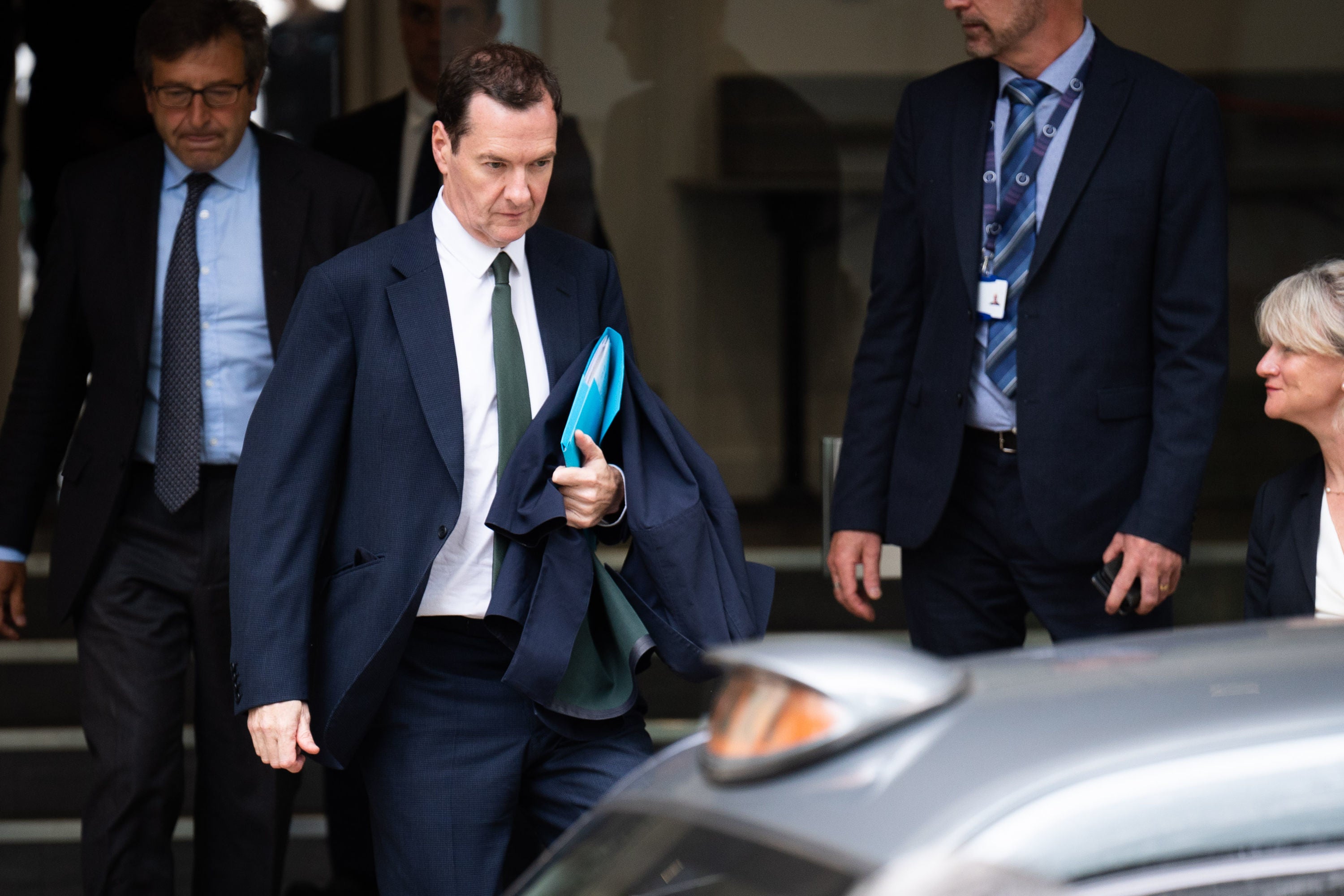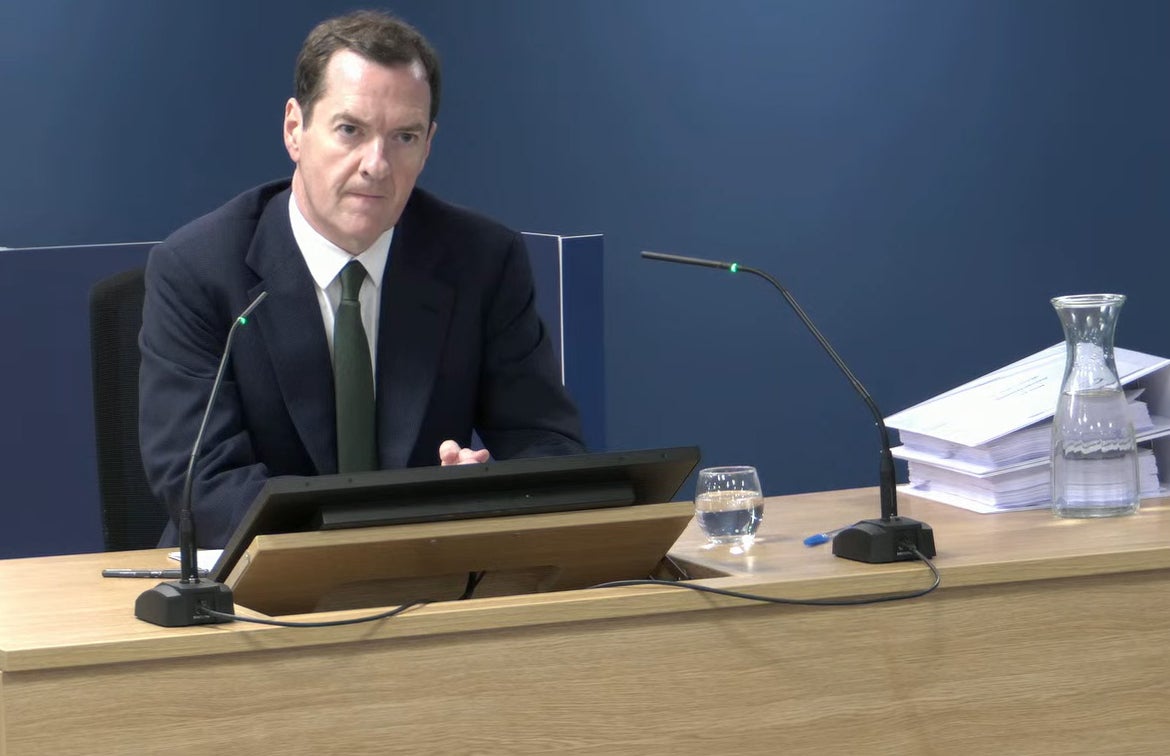Covid inquiry – live: George Osborne claims austerity had ‘positive’ effect on UK’s ability to withstand Covid
George Osborne is giving evidence to the Covid inquiry today
Your support helps us to tell the story
From reproductive rights to climate change to Big Tech, The Independent is on the ground when the story is developing. Whether it's investigating the financials of Elon Musk's pro-Trump PAC or producing our latest documentary, 'The A Word', which shines a light on the American women fighting for reproductive rights, we know how important it is to parse out the facts from the messaging.
At such a critical moment in US history, we need reporters on the ground. Your donation allows us to keep sending journalists to speak to both sides of the story.
The Independent is trusted by Americans across the entire political spectrum. And unlike many other quality news outlets, we choose not to lock Americans out of our reporting and analysis with paywalls. We believe quality journalism should be available to everyone, paid for by those who can afford it.
Your support makes all the difference.Austerity had a “positive” effect on the UK’s ability to withstand the Covid-19 pandemic, former chancellor George Osborne has claimed.
In his witness statement submitted to the Covid inquiry, Mr Osborne said austerity had a positive effect because it meant public finances recovered.
“Reducing the deficit and placing debt as a percentage of GDP on a downward path was also essential to rebuild fiscal space to provide scope to respond to future economic shocks,” Mr Osborne said.
“I have no doubt that taking those steps to repair the UK’s public finances in the years following the financial crisis of 2008/09 had a material and positive effect on the UK’s ability to respond to the Covid-19 pandemic,” he continued.
George Osborne is giving evidence to the Covid inquiry today after a doctor’s union said the former chancellor must be “taken to task” over austerity-era decisions that “left us so unprepared” for the pandemic.
It comes after David Cameron said he is “desperately sorry” for the loss of life during the pandemic on Monday.
We are pausing our live updates for this afternoon, you can read more on the Covid inquiry here.
Goerge Osborne concludes evidence

Former chancellor George Osborne has now finished giving evidence to the Covid inquiry.
Economic planning focused on sickness absence - not potential lockdowns - Osborne
In the final question, Mr Osborne was asked whether government economic pandemic planning focused on sickness absence - not the effects of lockdowns or social distancing.
Mr Osborne said he agreed this is the case, but said no Treasury in the world prepared for a lockdown.
He said: “Through the [austerity] programme we pursued we created the fiscal space so we could end up spending £370bn to help people deal with the adverse effects that the lockdown introduced.”
‘We prioritised health,' says Osborne
Asked if NHS funding “simply wasn’t enough,” Osborne replied: “No, I don’t accept that.”
He continued: “What I accept is that you could spend more money on the NHS... but you have to make a calculation balancing the resources each of those services get and the central calculation which every household has to make is what can we actually afford.
“I think we prioritised health.”
Osborne 'completely rejects' austerity resulted in depleted health and social care
George Osborne has argued that his austerity programme while chancellor made Britain better prepared to weather the coronavirus pandemic.
Inquiry barrister Kate Blackwell KC asked: “Do you agree by the time Covid-19 hit the consequences of austerity were a depleted health and social care capacity and rising inequality in the UK?”
Mr Osborne said: “Most certainly not, I completely reject that.
“I would say if we had not done that Britain would have been more exposed, not just to future things like the coronavirus pandemic, but indeed to the fiscal crisis which very rapidly followed in countries across Europe...”
He said he needed to repair the “seriously impaired public finances” following the “massive economic shock” of 2008.
“If we had not had a clear plan to put the public finances on a sustainable path then Britain might have experienced a fiscal crisis, we would not have had the fiscal space to deal with the coronavirus pandemic when it hit...”
George Osborne defends austerity measures
George Osborne reiterated his defence of the austerity measures he oversaw as chancellor between 2010 and 2016.
Giving evidence at the UK Covid-19 Inquiry, he said: “The one thing I’m sure of is there’s no point having a contingency plan you can’t pay for.
“And absolutely central to all of this is the ability of your economy and your public finances to flex in a crisis.”
Poorer countries couldn't afford lockdowns - we could, Osborne says
When a crisis hits, Mr Osborne said: “You need to be able to respond… and throw large amounts of public funds at the problem… without a fiscal or financial crisis.”
Mr Osborne said he believes this happened in the UK during the Covid pandemic.
He added: “Poorer countries in the world were not able to afford lockdowns or provide loans for businesses to stay in operation.”
There should have been a lockdown plan - Osborne concedes
Asked “Should there have been a plan, blueprint or playbook” from the Treasury when something like the pandemic occurred, Osborne replied: “In hindsight, yes”.
There was no planning for a lockdown - Osborne

“There was no planning for a lockdown,” George Osbourne has said, but questioned whether such a plan would have led to a better furlough scheme anyway.
The UK had a plan for an influenza pandemic, he said.
He added that the Treasury did not plan to ask the public to stay home for months.
The former chancellor told the inquiry: “You’re absolutely right there was no planning done by the Treasury for asking the entire population to stay at home for months and months on end, depriving large sectors of the economy like hospitality for months,” he says.
“If someone had said ‘you the UK government should be preparing for a lockdown that might last for months’ then I’ve no doubt the Treasury would’ve developed the schemes it did around furlough and loans.”
He added that “it isn’t fair to blame someone directly.”
George Osborne claims austerity had ‘positive’ effect on UK’s ability to withstand Covid
Austerity had a “positive” effect on the UK’s ability to withstand the Covid-19 pandemic, former chancellor George Osborne has claimed.
In his witness statement submitted to the Covid inquiry, Mr Osborne said austerity had a positive effect because it meant public finances recovered.
“Reducing the deficit and placing debt as a percentage of GDP on a downward path was also essential to rebuild fiscal space to provide scope to respond to future economic shocks,” Mr Osborne said.
“I have no doubt that taking those steps to repair the UK’s public finances in the years following the financial crisis of 2008/09 had a material and positive effect on the UK’s ability to respond to the Covid-19 pandemic,” he continued.
George Osborne is giving evidence to the Covid inquiry today after a doctor’s union said the former chancellor must be “taken to task” over austerity-era decisions that “left us so unprepared” for the pandemic.


Join our commenting forum
Join thought-provoking conversations, follow other Independent readers and see their replies
Comments